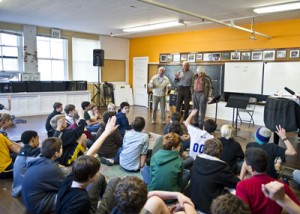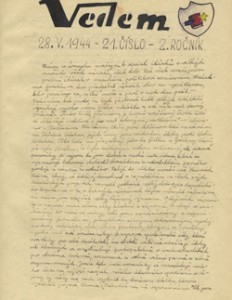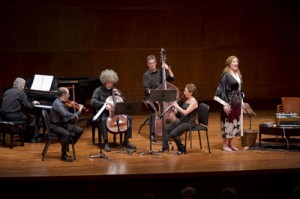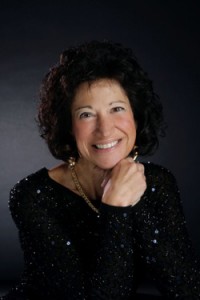Arts
Music
The Arts: Memory and Music

Members of the multiethnic Northwest Boychoir of Seattle listen intently as three elderly men, survivors of Terezin, tell of the underground magazine they created when they were boys in the concentration camp. They had called their magazine Vedem, Czech for “in the lead.”
This very special storytelling session—a vision of the future of Shoah remembrances—took place during a choir rehearsal, held in preparation for the world premiere performance of Vedem, the oratorio that turned the magazine into music.
From magazine pages buried by one of its young creators and retrieved after the war, the award-winning American composer Lori Laitman created the Vedem oratorio. The Boys of Terezin, a companion film featuring the young singers of the Boychoir’s personal encounter with those survivors, premiered in October 2011.
The performance, the film and the recording of Vedem were launched by a commission from Seattle’s unique classical music venture, Music of Remembrance.

“We started out as a local organization with an impact that was basically regional,” recalls pianist Mina Miller, founder and artistic director of MOR, which this fall begins its 15th season of concerts, educational outreach and recordings. “And while the mission at the time was always to honor Holocaust composers and their legacy through performance, it was also always part of the mission to commission new Holocaust-inspired works.”
Miller’s passionate insistence that “voices of musical witness be heard” has earned the chamber music project critical accolades, public and private funding and, thanks to the Web, a growing international audience. (The Vedem project has also brought about the reunion, after 65 years, of survivors of that boyhood underground Terezin publishing club. The Boys of Terezin has been screened at film festivals from Adelaide and Sydney to Toronto and Miami. A 15-minute version of the Vedem story for schools, The Boys of Home One, is part of a complete educator’s guide anyone can download from MOR’s or the film’s web site.)
With first-rate artists—from Seattle Symphony principals to internationally acclaimed opera stars and award-winning conductors, choreographers and filmmakers—MOR continues to break new ground. “In some ways,” Miller adds, “MOR was important for creating the groundwork for other organizations all over the world to start playing music of [composers who were murdered in the Shoah, like] Hans Krasa, Gideon Klein, Erwin Schulhoff, Pavel Haas and Viktor Ullmann. We were basically doing it before other people were doing it…but MOR’s focus is the new works by leading composers telling important stories.

“These new works bridge generations. They focus fresh creative energies on the vital lessons of the Holocaust for whole new generations.”
On May 5, 2005, Yom Hashoah events at Yad Vashem in Jerusalem included a performance by the Israel Chamber Orchestra of the MOR-commissioned Letter to Warsaw by Thomas Pasatieri. The music represented a turning point in MOR’s history, says Miller, bringing its projects worldwide attention. The combined international star power of Letter to Warsaw’s conductor, Gerard Schwarz, and Jane Eaglen, its celebrated soprano soloist, launched an important recording relationship with Naxos, a powerhouse of recorded classical music. Through Naxos, music is available as downloads as well as CDs, making the whole Naxos catalog, including such niche entries as MOR’s, affordable and accessible. Letter to Warsaw, recorded and released by Naxos in 2004, caught the attention of Yad Vashem’s planners just in time for the first Yom Hashoah programs at its new Holocaust history museum.
So far, Naxos has released five MOR recordings, including the world premiere recording of Tony Kushner’s English translation of the Terezin children’s opera Brundibar, featuring the Northwest Boychoir.
And there’s more on the way: An album of music by American composer Jake Heggie, a current favorite among contemporary opera buffs, is planned for 2013 and will include two MOR-commissioned works exploring the complex life of Krystyna Zywulska. Born Sonia Landau in Lodz, Poland, in 1914, Zywulska walked away from the Warsaw Ghetto and the Jewish community, wound up in Auschwitz and survived to write and explore her Jewish identity. Her wrenching poetry, composed in Auschwitz, will be set to music by Heggie; the piece will premiere at MOR’s upcoming spring concert. It will share the album with Heggie’s first Zywulska portrait, Another Sunrise, which premiered at MOR’s spring 2012 concert to critical acclaim. It was hailed by England’s Gramophone magazine as a “not to be missed” event.
From the original schedule of two concerts per year, commemorating Kristallnacht in the fall and Yom Hashoah in the spring, Miller and her colleagues have continued to expand opportunities for audiences to experience MOR’s music. The project’s hardworking core players—mostly Seattle Symphony artists on violin, clarinet, viola and cello, sometimes with percussion and, often, voices—with Miller as pianist and speaker, perform at public high schools and retirement homes and offer a series of free lecture-performances at museums and other public venues..

MOR commissioned Israeli composer Betty Olivero of Bar-Ilan University to create a piece related to Seattle’s Sefardic heritage as well as her own. Olivero’s 2011 Kolo’t invoked the instruments and Ladino language of Thessalonika, honoring her grandparents, murdered in Auschwitz. Seattle Symphony Conductor Laureate Gerard Schwarz’s 2007 MOR-commission compisition, the Vienna-infused Rudolf and Jeannette, honored the grandparents he never knew—“Shot,” as he tells it, “at the edge of an open grave at the concentration camp in Riga, Latvia.”
Heggie’s chamber opera For a Look or a Touch, commissioned, premiered and recorded for Naxos by MOR, introduced many listeners to the personal story of the German Zionist resistance fighter Gad Beck, who died in June of 2012. He was reportedly the last gay Jewish concentration camp survivor. The title of the piece comes from another survivor’s report of the simple gestures that could result in arrest for homosexuals in Nazi Germany.
Morgan Smith, the baritone who embodied the role of Beck’s lover, Manfred Lewin, for the performance and recording, has been tapped by Miller as artistic advisor, and a possible heir to the role of artistic director of MOR. Smith’s operatic career is skyrocketing, in part thanks to his work with Heggie.
Smith sees MOR as “an organization that not only promotes new music but teaches lessons we continue to need. I personally have valued opportunities through MOR to interact with students, and to make classical music and new music more accessible. We’re still fighting this ‘aristocratic’ stigma.
“It was a real honor for me that Mina asked me to play more of a role,” he notes. “This has been her baby for fifteen years.”
Smith acknowledges the “very strong advisory role” that Miller’s business- and tech-savvy husband, David Sabritt, continues to play in keeping the organization fiscally responsible. Acknowledging the demands of his busy, Leipzig-based singing career, Smith says first, he would like “to get more people involved as members and potential donors.” He would like to find an airline sponsor, to bring talent from around the world into the MOR project. “One thing I envision is the possibility of exchanges with cultural organizations in other countries.
“The crimes of the Holocaust of course will always be central,” he says, in response to whether a future for MOR might include telling stories of survivors from elsewhere. “There is value in telling stories through music, especially as the generation that can give firsthand accounts is passing.”
This fall, MOR launches its 15th season by breaking its own new ground: two concerts instead of one on the anniversary of Kristallnacht. This will be MOR’s first performance of Viktor Ullmann’s mordant opera The Emperor of Atlantis, composed in Terezin but suppressed before it could be performed there. (The title character, too recognizably Hitler-like, is foiled when death goes on strike. The show finally premiered in 1975 in Amsterdam.) With 14 instrumentalists, 7 singers, a stage director and the MOR conducting debut of Seattle Symphony’s still-new music director, Ludovic Morlot, Miller says she’s “breaking the bank” on this production.
When MOR launched in 1998, its annual budget was $20,000; now, in addition to in-kind contributions, it is closer to $400,000. “Expensive though it will be, The Emperor of Atlantis is something I’ve been wanting to do for a long time,” Miller admits. “As you know, I’m still committed to Holocaust-era works. I was reluctant to do something on a large scale, but now is the time.”










 Facebook
Facebook Instagram
Instagram Twitter
Twitter
Leave a Reply